- Home
- Martha Freeman
The Orphan and the Mouse Page 6
The Orphan and the Mouse Read online
Page 6
Mrs. George had endured Polly’s second thoughts before. Now she spoke firmly. “You and the nurse have earned your money. At the same time, should you ever be tempted to tell what you know, you can expect the authorities to deal with you harshly. Not everyone sees our enterprise in its proper light.”
Matron Polly swallowed. “No, ma’am.”
“Is the nursery ready?” asked Mrs. George.
“Nearly.”
“Go and finish up with it, then. I’ll be back before lunchtime.”
Chapter Twenty-Four
Shortly after nine o’clock, Mrs. George drove her Nash sedan across the Schuylkill River to the lying-in hospital in West Philadelphia. The sky was blue and the air not so humid as usual. Mrs. George’s white dress and jacket, which resembled a nurse’s uniform, remained crisp and professional.
In 1949 most women delivered their babies in hospitals, just as they do today. Other details, however, were quite different. In the special hospitals for mothers and babies, which were called maternity or lying-in hospitals, the doctors were all men and the nurses all women. After delivery, mother and baby typically remained hospitalized for an entire week. One reason was that painkillers given during labor lingered in the body, leaving new mothers drowsy and confused.
Because visiting hours were strictly limited, many mothers felt isolated from friends and family. It would have been unthinkable for anyone other than medical staff to be present during birth.
The lying-in hospital Mrs. George sought was a two-story brick building that took up half a city block. In accordance with instructions received from Polly, Mrs. George drove past the entrance and made a left onto a side street, then a second left into an alley. There she parked in front of a delivery van and waited a few moments until a stout gray-haired woman dressed in a nurse’s uniform emerged from a back entrance and looked around.
Mrs. George took a clipboard with a typed page on it from the passenger seat and alighted from the car. Without introducing herself, she said, “You must be Polly’s acquaintance.”
“I am Mrs. Babst.” The woman eyed Mrs. George up and down. “Now, about the money . . .”
“Polly will see to that. I’m sure she explained?” Mrs. George’s smile was icy and serene.
Mrs. Babst hesitated, but only for a moment. “Follow me.”
This particular hospital, which served the poor of the city, was busy and not especially clean. Gray-brown streaks dappled the walls and speckled the dingy linoleum floor.
Once their babies were born, new mothers were taken to a room with as many as a dozen beds. The babies, in turn, went to the hospital nursery, to be brought to their mothers four times a day for feeding. Those who cried were given only a pacifier, with the result that the baby nursery was a noisy place.
Besides alerting Polly to the birth of a desirable baby, Mrs. Babst was being paid to see to it that his mother had a private room.
The two women passed several nurses and orderlies in the hallway, all of them too harried to pay any attention. Finally, Mrs. Babst stopped in front of an open door and said to Mrs. George, “She’s in here.” Then she stepped inside. “Mrs. Dimitri?”
In fact, “Mrs.” Dimitri had never been married, a shameful situation for a mother at that time. For propriety’s sake, the staff called all the mothers “Mrs.”
Mrs. Dimitri was pale, with sunken dark eyes and uncombed hair. The shoulder of her green hospital gown was pulled down so she could nurse her baby, a flannel-blanketed bundle held securely to her chest.
Mrs. George had seen enough new mothers to know that this one’s exhausted appearance was normal. In fact, she was relieved to see that the girl looked healthy, with no sign on her cheeks of the spots that could indicate tuberculosis. Her good health boded well for the baby’s, a satisfaction to Mrs. George, who preferred not to purvey damaged goods, especially to a buyer as important as Miss Grahame.
“This is the lady I told you about,” said Mrs. Babst to Mrs. Dimitri.
“Oh. Yes?” Mrs. Dimitri’s puzzled expression said she didn’t remember being told about a lady.
“Yes,” Mrs. Babst assented. “You just go along and do what she says, now. I have to see to other patients.”
Mrs. Babst left without looking back. Mrs. George approached the bed.
“Hello, dear. How are you feeling?” Mrs. George had perfected a brisk, soft-spoken way of addressing new mothers.
“Tired, but they tell me it’s normal. Are you a nurse?”
Mrs. George studied the girl, who looked young enough to be in school. “Of course. And I just need your handsome blond boy for a few tests. They won’t take long.”
The baby was nursing and was held tight in his mother’s arms. At first Mrs. George couldn’t see his face and had to trust that Polly’s friend hadn’t let her down, that this was an unblemished, straight-limbed infant good-looking enough to satisfy a movie star.
“He is my handsome boy,” Mrs. Dimitri said. “And I’m going to raise him right. That’s the important thing, isn’t it, Nurse?”
“Certainly it is. Now, I just need your signature on this document. It says you give permission for the tests.”
Instead of reaching for the pen, Mrs. Dimitri closed her eyes and lay back against the pillows. “All right. Just let me think a minute. It’s all been so much, and I’m so tired.”
“I understand, dear,” said Mrs. George. “But this is easy. Open your eyes, and I’ll show you where to sign. You can write your name, can’t you?”
“What kind of tests?” Mrs. Dimitri’s eyes remained closed.
“Routine procedures. They won’t hurt. The city requires it.”
“No needles?” Mrs. Dimitri said.
Mrs. George became aware of time passing. At any moment, some meddlesome doctor or clerk might come in and ask to see the papers in her hand. “Nothing like that,” she said. “But I am on a schedule, Mrs. Dimitri. The sooner I take him, the sooner I can bring him back.”
Mrs. Dimitri sighed, sat up, rearranged her hospital gown. “All right. Show me again what this is.”
The page on the clipboard was typewritten on heavy legal stock. Mrs. Dimitri’s full name had already been entered by Judge Mewhinney’s clerk, as had the date. All the young mother had to do was sign on the appropriate line. In fact, the wording had nothing to do with medical procedures. Rather, by signing it, Janet Rose Dimitri agreed to give up all parental rights to her newborn son and, under the laws of the City and County of Philadelphia, thereby release him for adoption.
For Mrs. George, this was the moment of truth. Should the girl actually read the documents, she might refuse to sign, might even call out and make a scene. In that case, Mrs. George was prepared to apologize, say she’d made a mistake, and beat a hasty retreat. She had never had to do that before . . . but she was ready.
Mrs. George felt her heart bump, but her voice was soothing. “Go ahead, dear.”
At last, Mrs. Dimitri took the pen, wrote her name in neat, round cursive, handed back the clipboard, and subsided into the pillows.
Seeing the signature, Mrs. George smiled a genuine smile. “I’ll just take him, then.” She reached down, slid her soft, manicured hands beneath the warm bundle, and lifted.
Well fed and comfortable, the baby boy nestled into her shoulder.
“Good-bye, dear. And thank you,” said Mrs. George; then, in three quick strides, she was safe in the hallway.
“Nurse?” Mrs. Dimitri called after her. “Nurse?”
But it was too late. Looking straight ahead, the baby thief strode briskly toward the exit to the alley where her car was waiting.
Chapter Twenty-Five
Caro couldn’t imagine why Mrs. George had called her into her office that afternoon. She was sure she hadn’t done anything wrong. But Mrs. George was not in the habit of inviting children to her office to praise them.
Halfway down the corridor she figured it out, or thought she did. It was because she had rescued that mouse
the other night. Had to be. Caro hadn’t smiled since Miss Grahame’s visit, but she did now—even if she was about to get in trouble. The mouse had been so dear, seemingly so grateful and polite. Caro knew how Mrs. George hated mice, and rescuing this one was the closest she had ever come to an act of rebellion.
As for the delayed consequences, maybe Matron Polly hadn’t told Mrs. George till now?
Caro knew she owed Mrs. George everything. Without her, Caro would have been sent to some terrible place after her mother died. Grateful, Caro had repaid Mrs. George as best she could, doing small things, like wiping the jam off Annabelle’s nose, but also more important ones—like setting a good example at chores and at school.
This bargain between them was never spelled out, but Caro thought it created a bond. Not that Caro loved Mrs. George, exactly. Mrs. George wasn’t soft the way a person you loved would be. She was strong and independent instead. And she was one more thing, an important thing. She was good.
Caro knew that. Everybody knew that. There were plaques all over Mrs. George’s office wall attesting to it, and photos of her with important people like the president’s wife, Mrs. Truman, and the governor’s wife, Mrs. Duff. There were cricles from newspapers and magazines articles by the dozen.
Once in a while, however, even good Mrs. George lost her temper—like that time when she boxed Jimmy’s ears.
This was on Caro’s mind as she knocked on the office door.
“Come in,” said Mrs. George.
Caro opened the door, noticing as she did that the headmistress’s expression was mild, even sympathetic. So it wasn’t the mouse, then. But what?
“Sit down, Carolyn,” Mrs. George said. “I just wanted to tell you how sorry I am about the remark Miss Grahame made. It was thoughtless. I’m sure she did not intend to hurt your feelings.”
Caro was so taken aback she didn’t reply right away. Finally, she said, “No, ma’am,” then, “Is that all, ma’am?”
“No.” Mrs. George rose from her chair. “Come with me. I have a little job for you to do.”
Baffled, Caro followed Mrs. George up the stairs to the second floor and down the hallway past the classrooms. When at last they turned into the nursery, Caro saw that one of the bassinettes was occupied.
“Oh!” she gasped, and ran to look. “It’s a tiny one! Boy or girl?”
“Boy,” said Mrs. George.
Caro studied the baby, who looked toward her with deep-blue unfocused eyes. His face was red and scrunched under a fuzzy thatch of pale hair. On the side of his head, just above the ears, were pale purple bruises. Caro knew what that meant. The doctor had used a forceps to help with delivery, and the forceps had left the marks.
Bruises and all, the boy was beautiful. “Why is he here at Cherry Street?” Caro asked.
Mrs. George pursed her lips. “A terrible thing. The police found him abandoned on the doorstep of one of the precinct houses. Not even a note. He’s lucky a stray dog didn’t take him.”
Caro shuddered, but she was not shocked. The children at Cherry Street knew bad things happened in the world. Some of the children had suffered very bad things themselves, or seen other children suffer, and they talked about it. How could they not?
“But now he’s safe,” said Mrs. George briskly, “and just awakened from his nap. Matron Polly has changed his diaper, powdered him, and given him formula in a bottle. He’ll be fed again at five p.m.”
“You mean I’m to take care of him till then?”
Among the items in the cupboard the Cherry Street Home provided for Caro’s possessions was a baby doll given by church ladies four Christmases ago. She didn’t play with it anymore. She couldn’t without being teased. But every time she opened her cupboard and saw it, she thought of how it would have been to have a baby sister or brother—a family of her own.
Now, at least for a little while, she’d have a baby to herself, something wriggly and warm and special, just for Caro.
“Matron Polly will assist if you need her,” said Mrs. George. “Keep him comfortable. Carry him if he’s fussy. Lay him down in his crib if he’s not. Young ones like this sleep most of the time.”
“May I show him to the other girls?” Caro asked.
“Yes, provided they don’t have colds and they wash their hands,” said Mrs. George. “You don’t have a cold, do you?”
“No, ma’am,” said Caro. “What’s his name?”
“He doesn’t have one,” said Mrs. George. “The birth certificate, when the clerk prepares it, will just say ‘Baby Boy,’ the date he was found, and the location.”
“May I name him?” Caro asked.
“For the afternoon, I suppose you may.”
A few minutes later, Caro walked into the main parlor with a baby in her arms . . . and caused a commotion.
“Can I hold him?” “Lucky—I want a baby to play with!” “What’s his name?”
“Charlie.” Caro had named him after her war hero father. “And you may hold him once you’ve washed your hands.”
The three intermediate girls went to the washroom and returned, still clamoring to hold the baby.
“Can I feed him?” Barbara took Charlie.
“No, me!” said Virginia.
“Ew—I think he’s stinky,” said Betty.
“He is not,” said Caro.
“What are those marks on his head? They look like ink spots,” Barbara said.
“It’s from when he was born,” Virginia explained. “If there’s trouble and the baby gets stuck, the doctor uses an instrument called forceps. Sometimes they leave a mark.”
Caro already knew this and had stopped listening to her friends. Instead, she was thinking. The use of forceps meant Charlie had been delivered in a hospital. Delivered in a hospital . . . then abandoned at a police station? It didn’t make sense. Was Mrs. George mistaken?
The drowsy infant was passed from girl to girl under the watchful eye of Matron Polly, who did not interfere because she believed a quiet baby was a happy baby. Charlie himself dozed most of the time and made funny faces when he was awake. His best trick, the girls agreed, was yawning.
While Caro found Charlie endlessly fascinating, the other girls eventually grew bored. When he started to cry—a shrill, breathy, birdlike sound—they went looking for other things to do. Caro found Matron Polly in the kitchen helping Mrs. Spinelli with dinner. Matron Polly looked at her watch. “Another forty-five minutes yet.”
“But he’s hungry now,” Caro said.
Polly shrugged. “That can’t be helped. If he doesn’t have a schedule, he’ll become a little tyrant.”
Caro knew hunger made your stomach hurt, and she couldn’t bear the idea of that for Charlie. What did a tiny baby know about schedules?
Caro argued, but Matron Polly only shrugged. “I didn’t make the world.”
To console him, Caro held the baby against her shoulder, went up the stairs, and walked in and out of the empty classrooms, narrating all that she saw: “This is the American flag, this is a map of Pennsylvania, these white things are called chalk, these are books, these are the letters of the alphabet . . .”
Baby Charlie listened for a while, whimpered, wailed, and settled down again. Finally, it was five o’clock, and Caro returned to the nursery, where Matron Polly placed a bottle in a silver contraption that warmed formula to precise body temperature.
Caro handed Charlie over reluctantly.
“Can I take care of him again tomorrow?” she asked.
Matron Polly shrugged. “I don’t see why not.”
Chapter Twenty-Six
There had never been a Mr. George.
At twenty-one, the age when most women of her era married, pretty Helen George had had her share of suitors. But she didn’t care much for any of them, and certainly had no intention of sharing her life with one. Having grown up in Pennsylvania coal country with too large a family and too little money, Helen believed she had had quite enough of sharing for one lifetime.
But this was 1925, and a single woman—a spinster—was seen as pitiable or suspect. Something must be wrong. Normal girls married. So when she left home for the big city of Philadelphia, Helen invented a handsome young husband, named him Douglas after her favorite film star, then killed him off with a rare, unpronounceable disease.
Voilà! In the eyes of the world, Helen George was now a respectable young widow.
In Philadelphia, Mrs. George studied bookkeeping at a secretarial school, worked hard, and lived frugally in a rooming house where one of the other lodgers introduced her to a small-time bootlegger who was better at selling illegal rum than keeping track of profits.
The 1920s were the era of Prohibition, when the government made alcohol illegal to prevent people from drinking. Like a lot of good ideas, it didn’t work. People continued to drink, but now they bought their beer, wine, and liquor from enterprising criminals who smuggled it from abroad or made it themselves.
If Helen George had any qualms about involving herself with crime, she got over them when she saw how much money she was making. All her life she had scrimped and saved. All her life she had been poor. Now the steadily increasing sums in her bankbook told her those days were over. She finished school, bought a small house and more fashionable clothes, then found a daytime job in a lawyer’s office—all while continuing to keep books for the bootlegger. By the time Prohibition ended in 1933, he had expanded operations to the point that he was a significant force in the Philadelphia underworld.
Too significant, it turned out.
In the spring of 1934, he was shot dead in front of a South Seventh Street restaurant. Truthfully, Mrs. George wasn’t surprised . . . and by this time she wasn’t sorry, either. The business had become risky. She did not want to go to jail. She had been looking for a way to preserve her liberty, her skin, her tidy nest egg, and her improved social status—all without making her friend the onetime bootlegger mad.

 Goldilocks, Go Home!
Goldilocks, Go Home!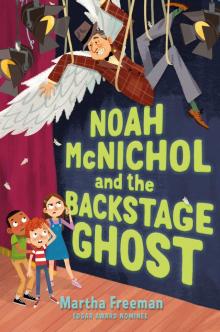 Noah McNichol and the Backstage Ghost
Noah McNichol and the Backstage Ghost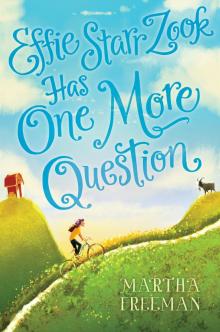 Effie Starr Zook Has One More Question
Effie Starr Zook Has One More Question P.S. Send More Cookies
P.S. Send More Cookies The Secret Cookie Club
The Secret Cookie Club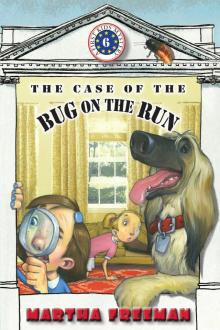 The Case of the Bug on the Run
The Case of the Bug on the Run The Case of the Rock 'n' Roll Dog
The Case of the Rock 'n' Roll Dog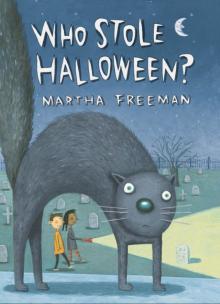 Who Stole Halloween?
Who Stole Halloween?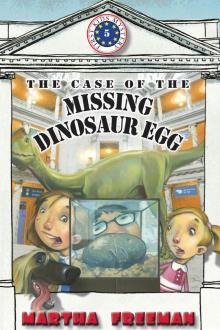 The Case of the Missing Dinosaur Egg
The Case of the Missing Dinosaur Egg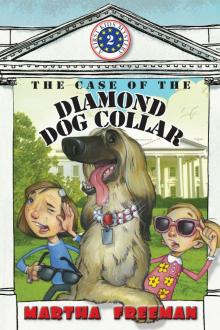 The Case of the Diamond Dog Collar
The Case of the Diamond Dog Collar Who Stole New Year's Eve?
Who Stole New Year's Eve? Strudel's Forever Home
Strudel's Forever Home Campfire Cookies
Campfire Cookies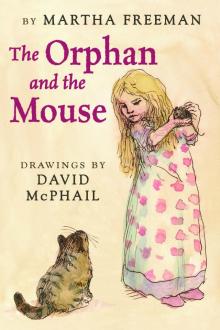 The Orphan and the Mouse
The Orphan and the Mouse Zap!
Zap!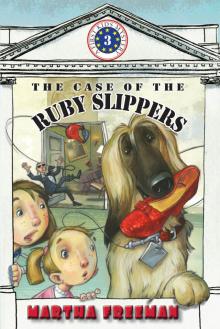 The Case of the Ruby Slippers
The Case of the Ruby Slippers